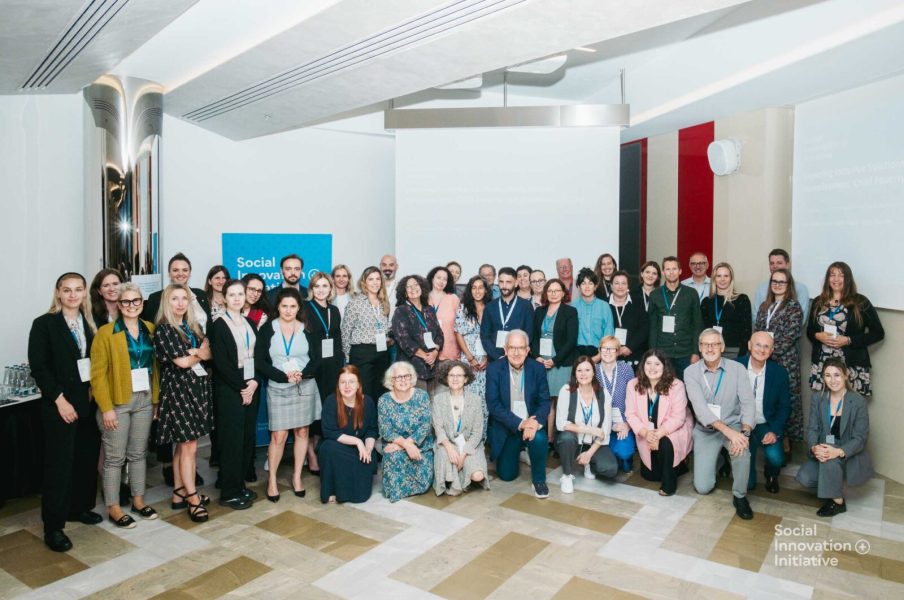
The European Competence Centre for Social Innovation, in collaboration with the Community of Practice on Social Inclusion, organised onsite event “Exploring Inclusive Solutions: Study Visit on Homelessness, Child Poverty, and Community Living” on 9–10 September 2024 in Prague, Czech Republic.
The event brought together stakeholders from several EU countries, including ESF+ Managing Authorities, representatives from Czech ministries, intermediate bodies, and implementing organisations. Participants gained in-depth insights into the Czech Republic’s social inclusion system, explored deinstitutionalisation, and examined the Housing First initiative, among other key topics.
As Luk Zelderloo, lead thematic expert of the Communities of Practice on Social Inclusion, highlighted: “Across the EU, we face the same or similar challenges regarding social inclusion. We all have children living in poverty, homeless people, and far too many people still in institutionalised care. Only by exchanging, sharing, and innovating will we be able to change these situations and improve people’s lives. In Prague, we exchanged, shared, explored, and challenged each other. Hopefully, this will facilitate our work.”
The event began with a warm welcome from Iveta Marcinová, Project Manager at the Ministry of Labour and Social Affairs and Chair of the Communities of Practice on Social Inclusion. Iveta Marcinová led a session on the Housing First initiative in the Czech Republic, highlighting both the successes and challenges of adopting this model to combat homelessness in the country.
Following this, Marta Miklušáková, Head of the Social Integration Department, provided an overview of the social inclusion system in the Czech Republic.
Milena Johnová, an expert on deinstitutionalisation from Inclusion Europe, delivered an insightful presentation on the ongoing efforts to transition from institutional care to community-based support in the Czech Republic.
After a brief break, Ina Sinkevičiūtė, Project Team Lead at the European Competence Centre for Social Innovation, guided participants through the complexities of transnational calls for proposals. Her session offered practical advice on navigating the structure and constraints of these calls to enhance the success of future applications.
Martina Štěpánková, Chief Director of the Section of European Funds and International Cooperation at the Ministry of Labour and Social Affairs, underscored the critical role of transnational cooperation in addressing complex societal challenges and expressed her pleasure at hosting such a significant gathering of European stakeholders.
The day continued with a hands-on workshop on call design and project development. Participants explored challenges and needs, along with ways to implement partnership principles and improve the dissemination of information regarding transnational calls.
The second day began with a recap of the previous day’s discussions, followed by study visits. Participants were divided into four groups, each visiting two organisations focused on social inclusion initiatives.
The study visits included Organisation BONA o.p.s., where participants learned about employment assistance through sheltered workshops and the development of social entrepreneurship initiatives. A visit to Člověk v tísni showcased how targeted social interventions, grounded in respect and shared responsibility, help individuals facing social exclusion.
Next, participants visited Prague 7, where they were introduced to programmes supporting the professional development of formal carers providing social care to individuals with dementia. At the Social Foundation of the City of Prague, participants explored the city’s efforts to promote philanthropic giving and encourage local residents to foster social cohesion and trust within their communities.
The tour continued at Rytmus, a non-governmental organisation dedicated to supporting individuals with disabilities, primarily mental, in actively participating in various aspects of life, including education, employment, residence, and leisure activities. Lastly, at the Sirius Foundation, participants learned about efforts to enhance parenting skills through an educational website, the largest of its kind in the country, serving as a key resource for parents, caregivers, and professionals working with children.
These visits provided participants with firsthand experience of the strategies and programmes addressing homelessness, child poverty, and community living in the Czech Republic.
Following the study visits, participants reconvened for a plenary session to share insights, reflect on key takeaways, and discuss how to apply these learnings in their own contexts. This interactive session fostered the exchange of observations and discussions on the impact of various approaches.
The event concluded with closing remarks from Mathilde Prilleux of the European Commission, DG EMPL, who emphasised the importance of continued collaboration and innovation in addressing social challenges across Europe.
We greatly appreciate the contributions of all participants, speakers, and organisers, which were instrumental in making this event a success!
European social fund agency
M. Katkaus str. 44, LT-09217 Vilnius
Company code: 192050725
Work hours:
I-IV 8:00-17:00 (Lunch break 12:00-12:45).
V 8:00-15:45 (Lunch break 12:00-12:45).
Phone: +370 (5) 264 9340
Email: info@esf.lt
